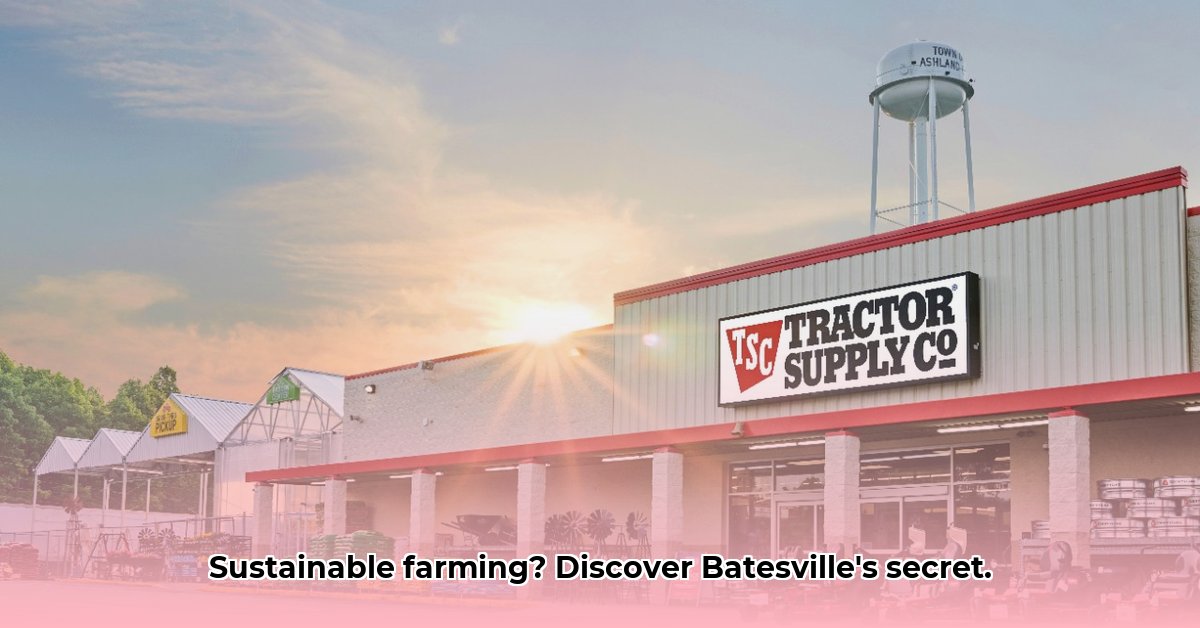
Tractor Supply Company (TSC) in Batesville, Arkansas, plays a significant role in the local agricultural community, supplying farmers and gardeners with essential products. However, the extent of its contribution to sustainable farming practices requires closer examination. This article analyzes TSC Batesville's current offerings, identifies opportunities for improvement, and proposes actionable steps to enhance its support for sustainable agriculture in the region. For similar initiatives in other areas, check out this nearby Tractor Supply.
Tractor Supply Batesville AR: Current Offerings and Community Impact
TSC Batesville provides a broad range of products, including livestock feed, fencing, tools, and equipment, catering to diverse farming needs. Its accessibility and generally knowledgeable staff contribute to its popularity among local residents. The store undeniably supports the area's agricultural landscape, serving both large-scale operations and smaller farms. However, a comprehensive assessment reveals a limited range of explicitly sustainable products, indicating a significant opportunity for growth.
Opportunities for Growth: Embracing Sustainable Practices
Expanding sustainable offerings represents a key growth opportunity for TSC Batesville. Currently, the selection of organic seeds, fertilizers, and eco-friendly pest-control options is limited. Increasing the availability of these products would attract environmentally conscious consumers and position the store as a leader in promoting sustainable agriculture.
This expansion extends beyond simply stocking new products. Educational initiatives, such as workshops on water conservation, composting, and integrated pest management (IPM) techniques, are critical. These workshops, led by agricultural experts, would empower local farmers with the knowledge and skills to adopt more environmentally friendly practices. By acting as an educational hub, TSC could transform from a simple supplier into a vital partner in building a sustainable agricultural community.
A Roadmap to a Greener Tractor Supply: Actionable Steps
A multi-phased approach, encompassing short-term and long-term goals, is necessary to effectively enhance TSC Batesville's sustainable practices.
Phase 1: Short-Term Goals (Within the Next Year)
Expand Product Lines: Conduct a thorough market analysis to identify gaps in the current selection of organic and eco-friendly products. Prioritize adding high-demand, high-impact sustainable alternatives to existing offerings. Goal: Achieve a 25% increase in certified organic product lines.
Invest in Staff Training: Implement comprehensive training programs focusing on sustainable farming practices and the environmental benefits of specific products. This will enable staff to confidently answer customer inquiries and provide informed recommendations. Goal: 100% of staff to complete a certified sustainable agriculture training program.
Enhance Community Engagement: Partner with local organizations, such as community gardens, schools, and agricultural extension offices, to host workshops and educational events. Engage with community influencers to increase visibility and awareness. Goal: At least three collaborative community events within the next year.
Phase 2: Long-Term Goals (Over the Next 3-5 Years)
Develop a Comprehensive Sustainability Program: Create a formal sustainability program incorporating responsible sourcing, operational efficiency, customer education, and community outreach. The program should align with widely recognized sustainability frameworks (e.g., B Corp). Goal: Formalize and publicly release the program within 2 years, aiming for B Corp certification within 5 years.
Reduce Carbon Footprint: Implement strategies to lessen the store's environmental impact. This includes exploring energy-efficient upgrades, waste reduction programs, and sustainable packaging solutions. Goal: Achieve a 15% reduction in carbon emissions within 5 years.
Incentivize Sustainable Choices: Develop a loyalty program or reward system to incentivize customers to choose sustainable products. Discounts or rewards for purchasing certified organic products or attending workshops would encourage environmentally conscious behavior. Goal: Launch a loyalty program within 1 year, featuring a 10% discount on certified sustainable products.
Navigating the Challenges: A Risk Assessment
Implementing these changes requires careful consideration of potential challenges. A risk assessment matrix helps to identify and proactively address these issues:
| Risk Factor | Likelihood (High/Medium/Low) | Impact (High/Medium/Low) | Mitigation Strategy |
|---|---|---|---|
| Low consumer demand for sustainable products | Medium | Medium | Conduct thorough market research; implement targeted marketing campaigns highlighting benefits. |
| Higher cost of sustainable products | Medium | Medium | Explore cost-effective sourcing; consider government incentives or price adjustments. |
| Supply chain disruptions | Medium | High | Diversify suppliers; build strong relationships with reliable, sustainable producers. |
| Lack of consumer awareness | High | Medium | Conduct educational workshops; collaborate with community influencers; utilize in-store signage. |
The Broader Picture: Tractor Supply's Role in Rural Development
TSC Batesville's commitment to sustainable agriculture has far-reaching implications. By embracing environmentally conscious practices, the store can influence the region's entire agricultural ecosystem, benefiting both the environment and the local economy. Active participation in promoting sustainable farming methods positions TSC as a leader in rural sustainability, impacting the wider community and fostering positive change.
How to Source Sustainable Livestock Feed Near Batesville AR
Key Takeaways:
- TSC Batesville's current sustainable offerings are limited, requiring a strategic expansion.
- Staff training and community engagement are crucial elements for successful implementation.
- A multi-phased approach fosters long-term success in supporting sustainable agriculture.
TSC’s role in providing sustainable livestock feed is currently underdeveloped. While the store carries livestock feed, lacking transparency regarding sourcing and sustainability certification makes it difficult for consumers to make informed purchasing decisions. This underscores the urgent need for readily available sustainable feed options. The path forward involves active collaboration between TSC, local farmers, and the wider community to prioritize environmentally responsible practices.
Tractor Supply Batesville Ar
Content about tractor supply batesville ar (Auto-generated fallback due to API error).